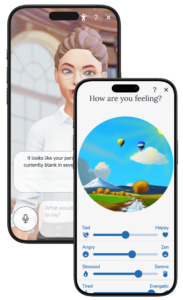
In a world where mental health is often neglected, the Open Synapses initiative aims to make hypnosis and psychological therapies accessible to all. This blog explores the challenges, solutions and testimonials surrounding this essential approach.
The importance of hypnosis in mental health
Hypnosis is often misunderstood and associated with entertainment or mystical practices. Yet it is a recognized therapeutic technique that can play an essential role in the treatment of mental disorders. Contrary to popular belief that hypnosis is a state of sleep or loss of control, it enables the patient to remain conscious and active in the therapeutic process.

Research shows that hypnosis can be effective in treating a variety of problems, including anxiety, depression and even chronic pain. By inducing a state of deep relaxation, hypnosis helps to access the unconscious mind, which in turn helps to modify negative behaviors or thoughts.

What's more, hypnosis doesn't always require a practitioner. Self-hypnosis, a practice that anyone can learn, offers tools for managing everyday stress and anxiety. It enables individuals to take control of their mental well-being and apply hypnotic techniques to real-life situations.
Clarifying preconceived notions about hypnosis
There are many preconceived ideas about hypnosis that can hinder its use in the mental health field. For example, many people believe that you need to be in a state of deep relaxation to benefit from hypnosis. In reality, it is possible to enter a hypnotic trance in normal waking states. This often happens in moments of intense concentration or engagement in an activity.

Another common misconception is that hypnosis is a form of manipulation. In fact, hypnosis is based on cooperation between practitioner and patient. The therapist guides the patient through techniques that allow him or her to explore the subconscious, but it is the patient who is in control of the experience.

Finally, it's important to note that hypnosis is not a miracle cure. It can be a powerful tool, but it must be used in conjunction with other forms of therapy and treatment. A holistic approach is essential to maximize the benefits of hypnosis as part of an overall mental health plan.
Self-hypnosis and its benefits
Self-hypnosis is a valuable skill that enables individuals to manage their own mental state. By learning to enter a hypnotic state on their own, people can develop strategies for coping with stressful or anxiety-provoking situations.

The benefits of self-hypnosis are varied. It helps reduce stress and anxiety, and even improves sleep quality. By integrating self-hypnosis into their daily routine, individuals can strengthen their resilience in the face of life's challenges.

What's more, self-hypnosis can be practiced anywhere, at any time. Whether at work, at home, or even on the move, self-hypnosis techniques enable you to achieve a state of calm and concentration without the need for special conditions.
The limits of existing solutions
Although many mental health solutions are available, they often have limitations. Meditation apps and hypnosis recordings can be helpful, but they often lack personalization. Each individual has unique needs that require a tailored approach.

Hypnosis recordings, for example, can become repetitive and fail to deliver the desired results. The absence of human interaction can also limit the effectiveness of these methods. Indeed, the support of a practitioner can enrich the experience and help overcome emotional blocks.

It is therefore crucial to consider hypnosis as a complement to traditional treatments. An integrative approach, combining self-hypnosis, sessions with a therapist, and other stress management methods, can offer a more effective path to mental health.
Challenges and concerns related to AI in mental health
While artificial intelligence (AI) opens up new avenues in the field of mental health, it also raises challenges and concerns. One of the main issues is data security. Applications using AI often collect sensitive personal information, which poses risks in terms of confidentiality. It is essential to ensure that this data is protected against breaches and misuse.

What's more, AI can sometimes give recommendations that lack nuance. AI models, however advanced, cannot always grasp the complexity of human emotions. This can lead to inappropriate or unsuitable advice for some users. It is therefore crucial that AI-based tools are used to complement human support, rather than replace it.

Finally, reliance on AI can also lead to a dehumanization of care. Human interaction remains fundamental to the treatment of mental health problems. AI cannot replace the empathy, compassion or deep understanding that a human therapist can bring to a patient.
The growing need for access to mental health care
Worldwide, the need for access to quality mental health care has never been greater. Many people suffer in silence, often due to stigma or a lack of resources. AI can play a key role in improving access, offering rapid solutions tailored to users' needs.

Digital platforms, powered by AI, overcome geographical and financial barriers. They offer flexibility that can prove crucial for those who can't afford in-person sessions. However, it's imperative that these solutions are accessible to all, without compromising quality of care.

It's also important to educate the public about the resources available. Many people are unaware that they can benefit from hypnosis or other AI-assisted therapies. Awareness campaigns can help break down barriers and encourage individuals to seek help.
Barriers to access to care
Despite technological advances, there are still a number of obstacles to accessing mental health care. The cost of treatment remains a major factor. In many countries, mental health care is not covered by insurance, making it inaccessible to many people.

In addition, the lack of qualified professionals is a growing concern. There is a shortage of trained therapists, leading to long waiting times for treatment. AI could help bridge this gap by offering accessible self-help solutions and support tools.

Finally, the stigma associated with mental health prevents many people from seeking help. Fear of judgment or discrimination can be paralyzing. It is crucial to promote a supportive culture where individuals feel comfortable talking about their problems.
Open Synapses evolution: Towards a free offer
Open Synapses' mission is to make hypnosis and psychological therapies accessible to all. The evolution of the platform towards a free offering represents a major step forward in this approach. By removing financial barriers, Open Synapses gives more people access to quality mental health tools.

This initiative reflects a desire to democratize access to healthcare. Users can now benefit from hypnosis programs, workshops and educational resources free of charge. This paves the way for greater inclusion and awareness of mental health issues.

What's more, the integration of AI into these programs enables sessions to be personalized, tailoring treatments to the specific needs of each user. This contributes to enhancing the effectiveness of therapies while making the user experience more engaging.
Conclusion: Towards accessible mental health for all
Mental health is a crucial issue that requires special attention and innovative solutions. Thanks to the advent of AI and initiatives like Open Synapses, it's possible to make care more accessible and tailored to individual needs.

It is essential that we continue to raise public awareness, educate about available resources and promote a culture of support. By removing barriers to access to care, we can contribute to a future where everyone can enjoy optimal mental health.

Together, let's move towards a society where mental health is not only recognized, but also valued and accessible to all.




































